|
Books Should Be Free Loyal Books Free Public Domain Audiobooks & eBook Downloads |
|
|
Books Should Be Free Loyal Books Free Public Domain Audiobooks & eBook Downloads |
|
Plays |
|---|
Book type:
Sort by:
View by:
|
By: Lucy Maud Montgomery (1874-1942) | |
|---|---|
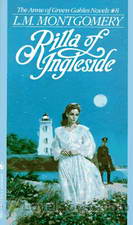 Rilla of Ingleside
Rilla of Ingleside
Rilla of Ingleside is the eighth book in the Anne of Green Gables series and focuses on the inspiring journey of Rilla Blythe, the youngest daughter of Anne and Gilbert, as she transforms from a carefree young girl into an enduring young woman swept into the chaos of war. Written from a female perspective, Montgomery accurately depicts a time in history, as she provides a contemporaneous account of the war and serves up the most emotional book in the series. Set during the First World War, the novel explores themes of coming of age, love, separation, and most importantly women’s roles during the war... | |
By: William Shakespeare (1564-1616) | |
|---|---|
 King Lear
King Lear
Considered to be one of Shakespeare's greatest plays, the tragedy King Lear portrays some of the darkest aspects of human nature that can be found in literature. The helplessness of the human condition, as we fall prey to our destinies, the injustice and random cruelties practiced by people, suffering and humiliation, the lust for power and the greed for wealth are all depicted in this magnificent play. And through it all, runs the golden thread of love and sacrifice, daughterly affection and the true nature of our relationship with our parents... | |
 Othello
Othello
In seventeenth century Venice, a wealthy and debauched man discovers that the woman he is infatuated with is secretly married to a Moorish general in the Venetian army. He shares his grief and rage with a lowly ensign in the army who also has reason to hate the general for promoting a younger man above him. The villainous ensign now plots to destroy the noble general in a diabolical scheme of jealousy, paranoia and murder, set against the backdrop of the bloody Turkish-Venetian wars. This timeless tale, Othello The Moor of Venice was one of the ten famous tragedies that William Shakespeare wrote... | |
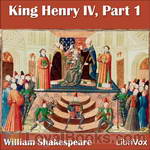 King Henry IV
King Henry IV
King Henry IV, Part 1 is the second of Shakespeare’s eight Wars of the Roses history plays, with events following those of King Richard II. As the play opens, King Henry IV (formerly Henry Bolingbroke) and Henry Percy (Hotspur) argue over the disposition of prisoners from the Battle of Holmedon. The King’s attitude toward Mortimer and the Percy family prompts them to plot rebellion. In the meantime, his son Prince Hal is living the low life in the company of Sir John Falstaff. As the time of battle nears, Prince Hal joins his father and is given a high command... | |
 The Merchant of Venice
The Merchant of Venice
William Shakespeare's The Merchant of Venice was probably written between 1596 and 1598, and was printed with the comedies in the First Folio of 1623. Bassanio, an impoverished gentleman, uses the credit of his friend, the merchant Antonio, to borrow money from a wealthy Jew, Shylock. Antonio pledges to pay Shylock a pound of flesh if he defaults on the loan, which Bassanio will use to woo a rich heiress, Portia. A subplot concerns the elopement of Shylock's daughter Jessica with a Christian, Bassanio's friend Lorenzo... | |
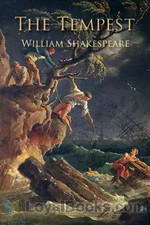 The Tempest
The Tempest
Banished from his own lands by a usurping brother, Prospero and his daughter Miranda have been living on a deserted island for years, until fate brings the brother within the range of Prospero's powers. Will he seek revenge, or reconcilement? | |
 King Richard II
King Richard II
The Tragedy of King Richard II, by William Shakespeare, is the first of the history series that continues with Parts 1 and 2 of King Henry IV and with The Life of King Henry V. At the beginning of the play, Richard II banishes his cousin Henry Bolingbroke from England. Bolingbroke later returns with an army and the support of some of the nobility, and he deposes Richard. Richard is separated from his beloved Queen, imprisoned, and later murdered. By the end of the play, Bolingbroke has been crowned King Henry IV... | |
 Much Ado About Nothing
Much Ado About Nothing
Written around the middle of his career, Much Ado About Nothing is one of Shakespeare's great festive comedies. The men are back from the war, and everyone is ready for romance. The dashing young Claudio falls for Hero, the daughter of Leonato, governor of Messina, and his friend Don Pedro helps him secure her affection. These youthful lovers are contrasted with the more experienced (and more cynical) Benedick and Beatrice, who have to be tricked into falling in love. Don Pedro's bastard brother, Don John, provides the intrigue, and the dimwitted constable Dogberry provides the laughs. | |
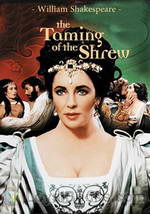 The Taming of the Shrew
The Taming of the Shrew
The Taming of the Shrew is one of Shakespeare's earliest comedies, and was inspired by classical Roman comedy and the Italian commedia dell'arte. Baptista Minola, a rich gentleman of Padua, has two daughters: Katherina, renowned for her sharp tongue, and Bianca, who is sought after by multiple suitors. Baptista decides that Bianca cannot marry until her elder sister finds a husband. Enter Petruchio, who has come to "wive it wealthily in Padua," and who is convinced by Bianca's suitors to woo Katherina. The play ultimately poses the question of who is the bigger shrew: Kate or Petruchio. The subplot involves the subterfuge employed by Lucentio to woo the lovely Bianca. | |
 Richard III
Richard III
Richard III is an early history play probably written and performed around 1592-93. It is the culmination of Shakespeare's earlier three plays about Henry VI, and chronicles the bloody career of Richard, Duke of Gloucester. As the play opens, the Wars of the Roses are over, King Edward IV (Richard's brother) is on the throne, and all is ostensibly well. The problem? Richard wants to be king - and he'll stop at nothing to realize his ambition. | |
 All's Well That Ends Well
All's Well That Ends Well
Despite its optimistic title, Shakespeare's All's Well That Ends Well has often been considered a "problem play." Ostensibly a comedy, the play also has fairy tale elements, as it focuses on Helena, a virtuous orphan, who loves Bertram, the haughty son of her protectress, the Countess of Rousillon. When Bertram, desperate for adventure, leaves Rousillon to serve in the King's army, Helena pursues him. | |
 The Comedy of Errors
The Comedy of Errors
The Comedy of Errors is one of William Shakespeare's earliest plays, believed to have been written between 1592 and 1594. It is his shortest and one of his most farcical comedies, with a major part of the humour coming from slapstick and mistaken identity, in addition to puns and word play. The Comedy of Errors tells the story of two sets of identical twins that were accidentally separated at birth. Antipholus of Syracuse and his servant, Dromio of Syracuse, arrive in Ephesus, which turns out to be the home of their twin brothers, Antipholus of Ephesus and his servant, Dromio of Ephesus... | |
 Henry V
Henry V
After the turmoil and uncertainty of Henry IV a new era appears to dawn for England with the accession of the eponymous Henry V. In this sunny pageant, the Chorus guides us along Henry's glittering carpet ride of success as the new king completes his transformation from rebellious wastrel to a truly regal potentate. Of course, there is an underlying feeling that the good times won't last, and this is all the more reason to enjoy the Indian summer before the protracted and bitter fall of the house of Lancaster. | |
 The Winter's Tale
The Winter's Tale
Mad with jealousy, King Leontes of Sicilia orders his best friend Polixenes killed, his child abandoned, and his wife put on trial for adultery. Sixteen years later, Perdita, raised as a shepherd's daughter, falls in love with Polixenes's royal son and returns to her father's kingdom. | |
 Measure For Measure
Measure For Measure
Generally considered one of Shakespeare's problem plays, Measure for Measure examines the ideas of sin and justice. Duke Vincentio turns Vienna's rule over to the corrupt Angelo, who sentences Claudio to death for having impregnated a woman before marriage. His sister Isabella, a novice nun, pleads for her brother's life, only to be told that he will be spared if she agrees to relinquish her virginity to Angelo. | |
 Love's Labour's Lost
Love's Labour's Lost
Love's Labour's Lost is an early comedy by William Shakespeare. Ferdinand, the King of Navarre, and his three friends take a vow of study and seclusion for three years, during which they are forbidden to see or speak to women. Their vows are immediately tested by the arrival of the Pricess of France and her three ladies to the King's court. | |
 Titus Andronicus
Titus Andronicus
Titus Andronicus may be Shakespeare's earliest tragedy; it is believed to have been written in the early 1590s. It depicts a Roman general who is engaged in a cycle of revenge with his enemy Tamora, the Queen of the Goths. The play is by far Shakespeare's bloodiest work. It lost popularity during the Victorian era because of its gore, and it has only recently seen its fortunes revive. | |
 Antony and Cleopatra
Antony and Cleopatra
Antony and Cleopatra is a tragedy by William Shakespeare, believed to have been written sometime between 1603 and 1607. It was first printed in the First Folio of 1623. The plot is based on Thomas North's translation of Plutarch's Life of Marcus Antonius and follows the relationship between Cleopatra and Mark Antony from the time of the Parthian War to Cleopatra's suicide. The major antagonist is Octavius Caesar, one of Antony's fellow triumviri and the future first emperor of Rome. The tragedy is a Roman play characterized by swift, panoramic shifts in geographical locations and in registers, alternating between sensual, imaginative Alexandria and the more pragmatic, austere Rome. | |
 Henry VI
Henry VI
Henry VI, Part 1 is a history play by William Shakespeare, believed to have been written in 1591, and set during the lifetime of King Henry VI of England. Whereas 2 Henry VI deals with the King's inability to quell the bickering of his nobles, and the inevitability of armed conflict, and 3 Henry VI deals with the horrors of that conflict, 1 Henry VI deals with the loss of England's French territories and the political machinations leading up to the Wars of the Roses, as the English political system is torn apart by personal squabbles and petty jealousy. | |
 Cymbeline
Cymbeline
Cymbeline is one of Shakespeare's late romances, which (like The Tempest and The Winter's Tale) combines comedy and tragedy. Imogen, the daughter of King Cymbeline of Britain, angers her father when she marries Posthumus, a worthy but penniless gentleman. The King banishes Posthumus, who goes to Rome, where he falls prey to the machinations of Iachimo, who tries to convince him that Imogen will be unfaithful. Meanwhile, the Queen (Imogen's stepmother) plots against her stepdaughter by trying to plan a match between Imogen and her worthless son Cloten. | |
 The Two Gentlemen of Verona
The Two Gentlemen of Verona
The Two Gentlemen of Verona is the earliest comedy written by Shakespeare (and possibly his first play), probably written around 1590-91. It focuses on two friends, Valentine and Proteus, whose friendship is disrupted by their mutual passion for the lovely Silvia. Proteus jilts Julia in order to pursue Silvia; she responds by enlisting the help of her maid Lucetta to dress as a boy and go after Proteus. The play also includes some wonderfully comic supporting characters, particularly Launce and his scene-stealing dog Crab. | |
 Troilus and Cressida
Troilus and Cressida
Troilus and Cressida is Shakespeare's "problem" play about the Trojan War. As the opening Chorus tells us, the play "begins in the middle" of the epic conflict, and counterpoints the drama of battle with the romance of the title characters. Just as Agamemnon and his Greek forces (particularly the smooth-tongued Ulysses) attempt to woo the invincible Achilles to resume fighting on their side, the Trojan go-between Pandarus tries to bring together Troilus, a son of King Priam, with his niece, the lovely Cressida. | |
 Henry VIII
Henry VIII
This is Shakespeare's dutiful tribute to one of the most imposing and terrifying rulers in European history. The kingdom trembles as the giant monarch storms through his midlife crisis, disposing of the faithful Katharine of Aragon and starting a new life and, the king hopes, a line of succession with the captivating young Anne Bullen. Unlike his predecessors, Henry has no doubt about the security of his tenure on the throne, and dominates the royal court with absolute authority. The extent of the King's power is graphically illustrated by the fate of the Duke of Buckingham, who goes calmly to execution while deploring, not the unjust despotism of the king... | |
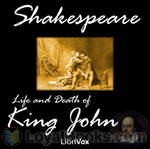 King John
King John
The Life and Death of King John, a history play by William Shakespeare, dramatises the reign of John, King of England (ruled 1199–1216), son of Henry II of England and Eleanor of Aquitaine and father of Henry III of England. It is believed to have been written in the mid-1590s but was not published until it appeared in the First Folio in 1623. John (24 December 1166 – 19 October 1216), also known as John Lackland or Softsword, was King of England from 6 April 1199 until his death. His reign... | |
 The Merry Wives of Windsor
The Merry Wives of Windsor
The Merry Wives of Windsor is a comedy by William Shakespeare, first published in 1602, though believed to have been written prior to 1597. It features the fat knight Sir John Falstaff, and is Shakespeare's only play to deal exclusively with contemporary Elizabethan era English middle class life. | |